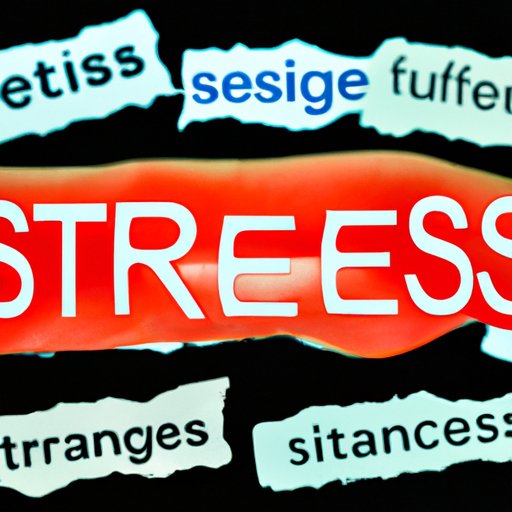
I. Introduction
Stress and fatigue are two pervasive and interlinked issues that impact people’s daily lives, affecting everything from work productivity to mood and physical health. In today’s fast-paced world, stress can seem unavoidable, but it is important to understand its impact and how it can lead to fatigue. This article aims to explore the connection between stress and fatigue, provide insights on the science and research behind it, and offer practical strategies for managing stress and fatigue.
II. The Surprising Connection between Stress and Fatigue: Understanding the Impact of Stress on Your Energy Levels
Stress has a powerful impact on the body, affecting everything from heart rate to hormone levels. In times of stress, the body releases adrenaline and cortisol, commonly known as the “stress hormones.” These hormones trigger the body’s “fight or flight” response, leading to increased heart rate, blood pressure, and metabolism. However, when stress becomes chronic, the impact on the body’s energy levels can be significant, leading to fatigue, irritability, and even anxiety and depression.
Research shows that chronic stress can lead to metabolic disturbances, potentially resulting in sugar cravings and weight gain. Additionally, stress can contribute to physical symptoms such as headaches, muscle tension, and weakened immune function, all of which can exacerbate fatigue.
III. From Burnout to Exhaustion: Learning How Stress Affects Your Sleep and Energy
A good night’s sleep is essential to maintaining good physical and mental health, but stress can interfere with sleep, leading to chronic fatigue and exhaustion. Cortisol, the stress hormone, can interfere with the body’s natural sleep cycle, making it difficult to fall asleep, stay asleep, and experience restful sleep. Additionally, stress can contribute to sleep disorders such as insomnia and sleep apnea.
To minimize stress-related sleep disruptions, it is important to develop good sleep hygiene practices and a calming bedtime routine. Strategies may include winding down before bed, limiting screen time, avoiding caffeine and alcohol, and creating a relaxing sleeping environment.
IV. Why Your Stress Might be Making You Tired (and What You Can Do About It)
It is essential to recognize the signs of burnout and identify the sources of stress in your life, whether it be work, relationships, or other factors. Once sources of stress are identified, there are numerous strategies for reducing stress levels. Mindfulness techniques such as meditation and deep breathing can help reduce stress levels, as can regular exercise and a healthy diet. Additionally, time management and prioritization can help reduce the sense of overwhelm that can lead to burnout and fatigue.
Cognitive and behavioral therapy can also be effective strategies for coping with stress and fatigue. These techniques involve identifying negative thought patterns and developing strategies for reframing them and improving mental health and resilience.
V. The Link between Chronic Stress and Chronic Fatigue: Strategies for Managing Both
Chronic stress can lead to chronic fatigue syndrome, a complex disorder characterized by long-term fatigue, muscle pain, and memory and concentration issues. There is no definitive cure for chronic fatigue syndrome, but treatment options can help manage the symptoms and improve energy levels. Lifestyle changes such as regular exercise, relaxation techniques, and improved sleep hygiene can be beneficial, as can seeking professional therapy and medication.
It is important to approach chronic stress and chronic fatigue holistically, developing a support system of friends, family, and professionals who can offer guidance and support. Other techniques to manage chronic stress and fatigue may include reducing workload, taking breaks, and engaging in self-care activities such as massage or acupuncture.
VI. Maximizing Your Energy Amidst Stress: Tips for Staying Alert and Productive When Stressed
Although stress can be overwhelming, there are numerous strategies for maintaining energy and productivity during stressful periods. Taking regular breaks, staying hydrated, and engaging in stress-reducing activities such as yoga or meditation can all help boost energy levels and reduce feelings of stress and fatigue. Additionally, it is important to set realistic goals and expectations during high-stress periods, prioritizing tasks and delegating when possible to prevent burnout.
VII. Conclusion
Stress and fatigue are pervasive issues that impact people’s daily lives, but it is important to view them holistically and recognize the impact that stress can have on our energy levels and overall well-being. By identifying sources of stress, developing stress-reducing habits such as mindfulness techniques and exercise, and seeking support when needed, it is possible to improve energy levels, prevent burnout, and cultivate a happier and healthier life.
For those struggling with stress and fatigue, additional resources include professional therapy and support groups, as well as online resources and self-help books.





